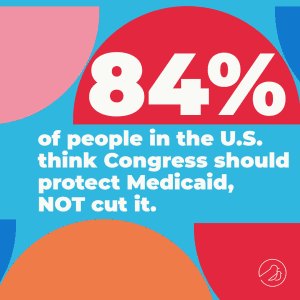April 24, 2023
McCarthy Goes After Most Vulnerable Americans as Condition for Raising the Debt Ceiling
 Speaker Kevin McCarthy has released a plan to raise the national debt limit by $1.5 trillion in exchange for an array of drastic budget cuts across dozens of domestic programs, setting off a frantic attempt in the House to gather GOP votes. The Republican proposal includes familiar targets for conservatives: Medicaid and SNAP (food stamps), both of which are lifelines for older Americans.
Speaker Kevin McCarthy has released a plan to raise the national debt limit by $1.5 trillion in exchange for an array of drastic budget cuts across dozens of domestic programs, setting off a frantic attempt in the House to gather GOP votes. The Republican proposal includes familiar targets for conservatives: Medicaid and SNAP (food stamps), both of which are lifelines for older Americans.
One way to cut funding is to institute additional work requirements on recipients for both Medicaid and SNAP. Overall, the deep cuts to Medicaid would dramatically affect 8 million seniors’ health care.
Estimates say that more than 2 million people would lose health coverage completely by failing to meet the Medicaid work requirement, sometimes for administrative reasons. The Congressional Budget Office has previously estimated that requiring non-disabled, non-elderly childless adults to work in order to receive Medicaid benefits would reduce the program’s spending by $135 billion over 10 years.
However, the proposal ignores the fact that voters in state after state, when asked whether they should expand Medicaid to working-age, childless adults to give more people access to health insurance, have voted in favor of doing so. People who don’t have employer-based insurance, but whose income is too high for them to qualify for Medicaid under stricter means testing, can get health coverage through Medicaid through the Affordable Care Act. Many of these adults are working in full-time jobs that do not provide health insurance.
Medicaid enrollment has roughly doubled from about 46 million people in 2007 to more than 92 million today, with North Carolina becoming the most recent state opting to join the program.
The House’s work requirement proposal — called a “community engagement” requirement in the bill’s text — would roll back those coverage gains by requiring many recipients to be working, looking for work, or participating in another kind of community service. Children under 18, adults over 56, people with mental or physical disabilities, and parents of dependent children would be exempted.
In Arkansas, where implementation of a work requirement was eventually blocked by a court order, nearly 17,000 people lost coverage after the requirement was put in place. Analyses later found that the policy didn’t lead to an improvement in Medicaid beneficiaries’ economic status; they simply became uninsured.
“There is a major risk for House Republicans if they continue down this path of destruction,” said Joseph Peters, Jr., Secretary-Treasurer of the Alliance. “Medicaid spending cuts are deeply unpopular with both the American public and lawmakers. Two-thirds of Americans oppose cutting Medicaid’s spending.”

